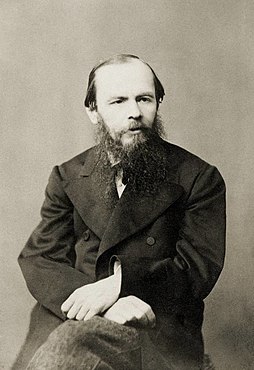
Fyodor Mikhailovich Dostoevsky, sometimes transliterated Dostoyevsky, was a Russian novelist, short story writer, essayist, journalist and philosopher. Dostoevsky's literary works explore human psychology in the troubled political, social, and spiritual atmospheres of 19th-century Russia, and engage with a variety of philosophical and religious themes. His most acclaimed works include Crime and Punishment (1866), The Idiot (1869), Demons (1872) and The Brothers Karamazov (1880). Dostoevsky's oeuvre consists of 11 novels, three novellas, 17 short stories and numerous other works. Many literary critics rate him as one of the greatest psychologists in world literature. His 1864 novella Notes from Underground is considered to be one of the first works of existentialist literature.

Alexander Sergeyevich Pushkin was a Russian poet, playwright, and novelist of the Romantic era who is considered by many to be the greatest Russian poet and the founder of modern Russian literature.

Russian literature refers to the literature of Russia and its émigrés and to the Russian-language literature. The roots of Russian literature can be traced to the Middle Ages, when epics and chronicles in Old East Slavic were composed. By the Age of Enlightenment, literature had grown in importance, and from the early 1830s, Russian literature underwent an astounding golden age in poetry, prose and drama. Romanticism permitted a flowering of poetic talent: Vasily Zhukovsky and later his protégé Alexander Pushkin came to the fore. Prose was flourishing as well. The first great Russian novelist was Nikolai Gogol. Then came Ivan Turgenev, who mastered both short stories and novels. Leo Tolstoy and Fyodor Dostoevsky soon became internationally renowned. In the second half of the century Anton Chekhov excelled in short stories and became a leading dramatist. The beginning of the 20th century ranks as the Silver Age of Russian poetry. The poets most often associated with the "Silver Age" are Konstantin Balmont, Valery Bryusov, Alexander Blok, Anna Akhmatova, Nikolay Gumilyov, Osip Mandelstam, Sergei Yesenin, Vladimir Mayakovsky, Marina Tsvetaeva and Boris Pasternak. This era produced some first-rate novelists and short-story writers, such as Aleksandr Kuprin, Nobel Prize winner Ivan Bunin, Leonid Andreyev, Fyodor Sologub, Aleksey Remizov, Yevgeny Zamyatin, Dmitry Merezhkovsky and Andrei Bely.

Mikhail Yuryevich Lermontov was a Russian Romantic writer, poet and painter, sometimes called "the poet of the Caucasus", the most important Russian poet after Alexander Pushkin's death in 1837 and the greatest figure in Russian Romanticism. His influence on later Russian literature is still felt in modern times, not only through his poetry, but also through his prose, which founded the tradition of the Russian psychological novel.

Eugene Onegin is a novel in verse written by Alexander Pushkin. Onegin is considered a classic of Russian literature, and its eponymous protagonist has served as the model for a number of Russian literary heroes. It was published in serial form between 1825 and 1832. The first complete edition was published in 1833, and the currently accepted version is based on the 1837 publication.

Mikhail Aleksandrovich Sholokhov was a Soviet/Russian novelist and winner of the 1965 Nobel Prize in Literature. He is known for writing about life and fate of Don Cossacks during the Russian Revolution, the civil war and the period of collectivization, primarily in his most famous novel, And Quiet Flows the Don.
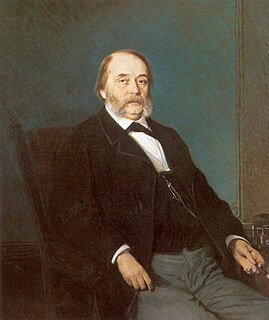
Ivan Alexandrovich Goncharov was a Russian novelist best known for his novels A Common Story (1847), Oblomov (1859), and The Precipice (1869). He also served in many official capacities, including the position of censor.

Karl Georg Büchner was a German dramatist and writer of poetry and prose, considered part of the Young Germany movement. He was also a revolutionary and the brother of physician and philosopher Ludwig Büchner. His literary achievements, though few in number, are generally held in great esteem in Germany and it is widely believed that, had it not been for his early death, he might have joined such central German literary figures as Johann Wolfgang von Goethe and Friedrich Schiller at the summit of their profession.
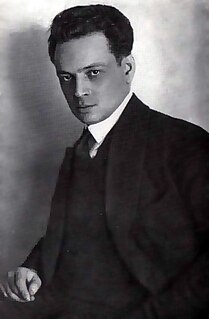
Yury Nikolaevich Tynyanov was a Soviet writer, literary critic, translator, scholar and screenwriter. He was an authority on Pushkin and an important member of the Russian Formalist school.

The Bronze Horseman is an equestrian statue of Peter the Great in the Senate Square in Saint Petersburg, Russia. Commissioned by Catherine the Great, it was created by the French sculptor Étienne Maurice Falconet. The name comes from an 1833 poem of the same name by Aleksander Pushkin, which is widely considered one of the most significant works of Russian literature. The statue is now one of the symbols of Saint Petersburg.

Dmitry Sergeyevich Likhachov was Russian medievalist, linguist, and concentration camp survivor. During his lifetime, Likhachov was considered the world's foremost scholar of the Old East Slavic language and its literature.
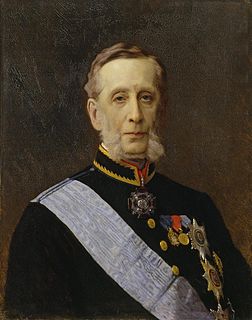
Count Pyotr Aleksandrovich Valuev; Russian: Пётр Алекса́ндрович Валу́ев was a Russian statesman and writer.

Samad Vurgun was an Azerbaijani and Soviet poet, dramatist, public figure, first People's Artist of the Azerbaijan SSR (1943), academician of Azerbaijan National Academy of Sciences (1945), laureate of two USSR State Prizes of second degree, and member of the Communist Party of the Soviet Union since 1940.

The Bronze Horseman: A Petersburg Tale is a narrative poem written by Alexander Pushkin in 1833 about the equestrian statue of Peter the Great in Saint Petersburg and the great flood of 1824. While the poem was written in 1833, it was not published, in its entirety, until after his death as his work was under censorship due to the political nature of his other writings. Widely considered to be Pushkin's most successful narrative poem, "The Bronze Horseman" has had a lasting impact on Russian literature. It is considered one of the most influential works in Russian literature, and is one of the reasons Pushkin is often called the “founder of modern Russian literature.” The statue became known as the Bronze Horseman due to the great influence of the poem.

Mirra Lokhvitskaya was a Russian poet who rose to fame in the late 1890s. In her lifetime she published five books of poetry, the first and the last of which received the prestigious Pushkin Prize. Due to the erotic sensuality of her works, Lokhvitskaya was regarded as the "Russian Sappho" by her contemporaries, which did not correspond with her conservative life style of dedicated wife and mother of five sons. Forgotten in Soviet times, in the late 20th century Lokhvitskaya's legacy was reassessed and she came to be regarded as one of the most original and influential voices of the Silver Age of Russian Poetry and the first in the line of modern Russian women poets who paved the way for Anna Akhmatova and Marina Tsvetaeva.

Valerian Nikolayevich Maykov was a Russian writer and literary critic, son of painter Nikolay Maykov, brother of poet Apollon and novelist Vladimir Maykov. Valerian Maykov, once a Petrashevsky Circle associate, was considered by contemporaries as heir to Vissarion Belinsky's position of Russia's leading critic, and later credited for being arguably the first in Russia to introduce scientific approach to the art of literary criticism.
Two Fates is a poem by Apollon Maykov, first published in 1845 in Saint Petersburg, as a separate edition, under the title "Two Fates. A Real Story by A.N.Maykov" and with considerable censorship cuts. It hasn't been re-issued in the author's lifetime and first appeared in its original form in The Selected Works by A.N.Maykov.
Three Deaths is a lyric drama by Apollon Maykov. Its original version, called "The Choice of Death", finished in 1851, had problems with censorship and was first published, severely cut, under the title Three Deaths in 1857, in the October (No.10) issue of Biblioteka Dlya Chtenyia. The final version of it appeared in the Complete A.N. Maykov (1893).
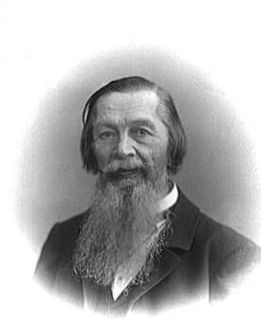
Pyotr Alexandrovich Yefremov was a Russian literary historian, publisher, editor and essayist whose works were published regularly by Sovremennik, Otechestvennye Zapiski, Russky Arkhiv, Russkaya Starina, Istorichesky Vestnik, newspapers Golos, Novoye Vremya, Russkiye Vedomosti. In 1864-1865 he edited the Knizhny Vestnik magazine. Praised as one of the most competent literary scholars of the 19th century, Pyotr Yefremov compiled, edited and published the series of The Works of: Denis Fonvizin (1866), Valerian Maykov (1867), Antiochus Kantemir (1867-1868), Vladimir Lukin (1868), Bogdan Yelchaninov (1868), Alexander Radishchev, Kondraty Ryleyev, Mikhail Lermontov, Vasily Zhukovsky, Alexander Pushkin, Alexander Polezhayev (1889). He is credited with having discovered, published and written analytical essays on numerous hitherto unknown autographs by classics like Pushkin, Ryleyev, Lermontov, Radishchev, Fonvizin, Zhukovsky.




















